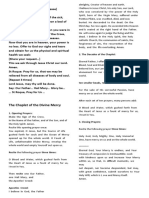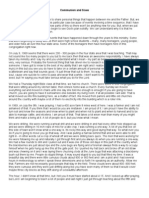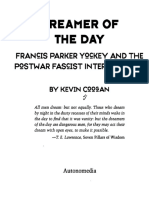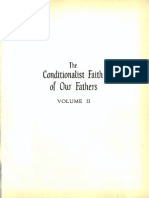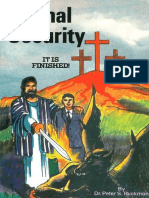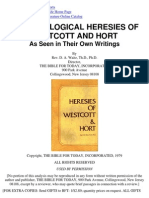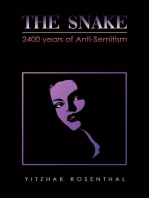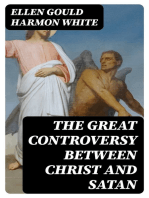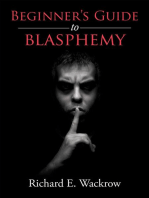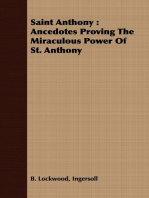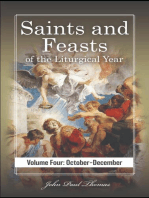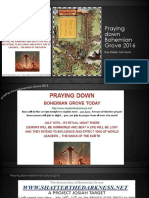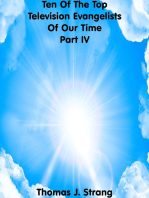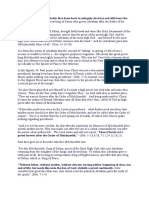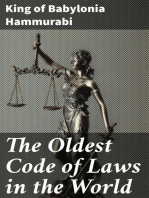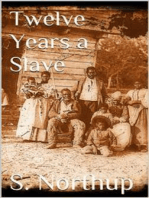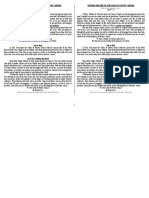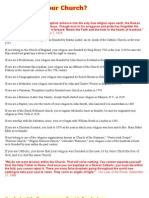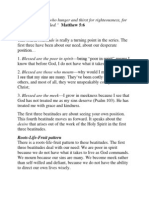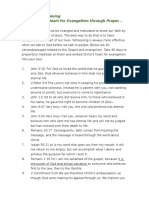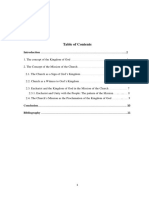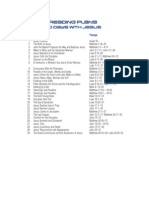Professional Documents
Culture Documents
Chicago Declaration of Evangelical Social Concern
Chicago Declaration of Evangelical Social Concern
Uploaded by
elfedegrOriginal Description:
Copyright
Available Formats
Share this document
Did you find this document useful?
Is this content inappropriate?
Report this DocumentCopyright:
Available Formats
Chicago Declaration of Evangelical Social Concern
Chicago Declaration of Evangelical Social Concern
Uploaded by
elfedegrCopyright:
Available Formats
Chicago Declaration of Evangelical Social Concern
Chicago Declaration of Evangelical Social Concern (1973)
As evangelical Christians committed to the Lord Jesus Christ and the full authority of the
Word of God, we affirm that God lays total claim upon the lives of his people. We
cannot, therefore, separate our lives from the situation in which God has placed us in the
United States and the world.
We confess that we have not acknowledged the complete claim of God on our lives.
We acknowledge that God requires love. But we have not demonstrated the love of God
to those suffering social abuses.
We acknowledge that God requires justice. But we have not proclaimed or demonstrated
his justice to an unjust American society. Although the Lord calls us to defend the social
and economic rights of the poor and oppressed, we have mostly remained silent. We
deplore the historic involvement of the church in America with racism and the
conspicuous responsibility of the evangelical community for perpetuating the personal
attitudes and institutional structures that have divided the body of Christ along color
lines. Further, we have failed to condemn the exploitation of racism at home and abroad
by our economic system.
We affirm that God abounds in mercy and that he forgives all who repent and turn from
their sins. So we call our fellow evangelical Christians to demonstrate repentance in a
Christian discipleship that confronts the social and political injustice of our nation.
We must attack the materialism of our culture and the maldistribution of the nation’s
wealth and services. We recognize that as a nation we play a crucial role in the imbalance
and injustice of international trade and development. Before God and a billion hungry
neighbors, we must rethink our values regarding our present standard of living and
promote a more just acquisition and distribution of the world’s resources.
We acknowledge our Christian responsibilities of citizenship. Therefore, we must
challenge the misplaced trust of the nation in economic and military might – a proud trust
that promotes a national pathology of war and violence which victimizes our neighbors at
home and abroad. We must resist the temptation to make the nation and its institutions
objects of near-religious loyalty.
We acknowledge that we have encouraged men to prideful domination and women to
irresponsible passivity. So we call both men and women to mutual submission and active
discipleship.
We proclaim no new gospel, but the Gospel of our Lord Jesus Christ who, through the
power of the Holy Spirit, frees people from sin so that they might praise God through
works of righteousness.
By this declaration, we endorse no political ideology or party, but call our nation’s
leaders and people to that righteousness which exalts a nation.
We make this declaration in the biblical hope that Christ is coming to consummate the
Kingdom and we accept his claim on our total discipleship until he comes.
November 25, 1973, Chicago, Illinois
Historic Context for the Declaration
As recounted by Dr. Ron Sider:
“At the first Calvin College conference on politics that Paul Henry organized in the
spring of 1973, half a dozen folk, including David Moberg, Rufus Jones, and Paul Henry,
decided to call a weekend workshop over Thanksgiving, 1973. We invited a broad range
of evangelical leaders to come and talk about the need for strengthening evangelical
social concern. About forty came–older evangelicals like Carl Henry, Frank Gaebelein;
younger evangelicals like Jim Wallis, John Perkins, Sharon Gallagher, Rich Mouw, and
myself. 1973 was a common year starting on Monday. … Evangelical has several distinct
meanings: In its original sense, it means belonging or related to the Gospel (Greek:
euangelion – good news) of the New Testament. … Carl F. H. Henry (January 22, 1913 –
December 7, 2003) was an evangelical Christian theologian, who founded the magazine
Christianity Today as a scholarly voice for evangelical Christianity and as a challenge to
the liberal Christian Century. …
We wrote and signed the now famous Chicago Declaration of Evangelical Social
Concern, confessing our failure to confront injustice, racism and discrimination against
women, and pledging to do better. Looking back, the Chicago Declaration sounds pretty
tame, but it was new and powerful in 1973.
Dick Ostling of Time magazine said that he thought it was probably the first time in the
20th century that forty evangelical leaders spent a whole weekend discussing social
action. And the Chicago Sun Times said that some day church historians may write that
“the most significant church-related event of 1973 took place” at this gathering.”
As Christianity Today magazine records the event:
“The conferees gathered to commit to social justice. The conference’s concern would not
be so unusual today. Now evangelicals left, center, and right agree that social justice is
one of the central callings of all Christians. Thirty years ago, only a frustrated minority—
like those at the Chicago meeting—thought so. Today evangelicals may disagree about
what policies will get us there, but they agree about the need to pursue “the righteousness
that exalts a nation.” Three decades ago, a lot of evangelicals would have called this
political meddling, if not selling out the gospel.
The radical shift in modern evangelicalism began when these assembled delegates met
amid the violence of inner city Chicago. They represented a wide array of traditions and
viewpoints, and they found that they had to confront each other if they were to assure that
the declaration they were crafting would be truly comprehensive and speak prophetically.
Their manifesto had to address economic justice, peacemaking, racial reconciliation, and
gender concerns within a biblical framework, and in ways that honored an evangelical
passion for others’ salvation in Jesus Christ.
The historic moment was not lost on two journalists who covered the Chicago meeting
and saw some “man bites dog” value to the story. Evangelical Protestants at the time
tended to be seen as Richard Nixon’s Silent Majority, the solid backers of the social
status quo. But in Chicago they were speaking out against injustice. Marjorie Hyer of The
Washington Post wrote at the time that the November weekend’s discussions “could well
change the face of both religion and politics in America.” And Chicago Sun-Times
religion writer Roy Larson wrote, “Someday American church historians may write that
the most significant church-related event of 1973 took place last week at the YMCA hotel
on S. Wabash.”
You might also like
- Jehovahs Witnesses Their Claims Doctrinal Changes and Prophetic Speculation What Does TheDocument19 pagesJehovahs Witnesses Their Claims Doctrinal Changes and Prophetic Speculation What Does ThePeter Vagn Jensen0% (1)
- Prayer To San RoqueDocument1 pagePrayer To San RoqueMIS MijerssNoch keine Bewertungen
- Communion and Sixes PM 512 - 2Document8 pagesCommunion and Sixes PM 512 - 2Praise YahshuaNoch keine Bewertungen
- Clayton FountainDocument12 pagesClayton FountainLee GaylordNoch keine Bewertungen
- Reli 1710 (Carleton University) Midterm NotesDocument19 pagesReli 1710 (Carleton University) Midterm NotesFadumo ElmiNoch keine Bewertungen
- Tracts On Prophecy, Mostly by H. L. Hastings, 1854Document228 pagesTracts On Prophecy, Mostly by H. L. Hastings, 1854sirjsslutNoch keine Bewertungen
- BlandinaDocument4 pagesBlandinaapi-260374540Noch keine Bewertungen
- Dreamer of The Day: Franqis Parker Yqckey and The Pqstwar Fascist InternationalDocument4 pagesDreamer of The Day: Franqis Parker Yqckey and The Pqstwar Fascist Internationalshaahin13631363100% (1)
- Adventista - Conditionalist Faith of Our Fathers Vol. 02Document1,356 pagesAdventista - Conditionalist Faith of Our Fathers Vol. 02Victor Fuenzalida Norambuena100% (1)
- Eternal SecurityDocument51 pagesEternal SecurityShrwan S100% (2)
- The Historical Novels of Mark Twain: Personal Recollections of Joan of Arc, The Prince and the Pauper & Yankee in King Arthur's CourtFrom EverandThe Historical Novels of Mark Twain: Personal Recollections of Joan of Arc, The Prince and the Pauper & Yankee in King Arthur's CourtNoch keine Bewertungen
- Cyrus Scofield Who Was HeDocument9 pagesCyrus Scofield Who Was HeTony ThomasNoch keine Bewertungen
- Exposing Myths About Christianity: A Guide to Answering 145 Viral Lies and LegendsFrom EverandExposing Myths About Christianity: A Guide to Answering 145 Viral Lies and LegendsRating: 4 out of 5 stars4/5 (4)
- The Sabbaths of YHVHDocument93 pagesThe Sabbaths of YHVHlisaNoch keine Bewertungen
- Theological Heresies of Westcott & HortDocument3 pagesTheological Heresies of Westcott & HortJesus LivesNoch keine Bewertungen
- The Great Controversy Between Christ and SatanFrom EverandThe Great Controversy Between Christ and SatanNoch keine Bewertungen
- Superstition in All Ages (1732) Common Sense by Meslier, Jean, 1664-1729Document160 pagesSuperstition in All Ages (1732) Common Sense by Meslier, Jean, 1664-1729Gutenberg.orgNoch keine Bewertungen
- William Miller: Selections From Contemporary BooksDocument137 pagesWilliam Miller: Selections From Contemporary Bookssirjsslut100% (1)
- Walt SmithDocument3 pagesWalt SmithkpdxhamNoch keine Bewertungen
- Saints and Feasts of the Liturgical Year: Volume One: January–MarchFrom EverandSaints and Feasts of the Liturgical Year: Volume One: January–MarchNoch keine Bewertungen
- Saint Anthony: Ancedotes Proving the Miraculous Power of St. AnthonyFrom EverandSaint Anthony: Ancedotes Proving the Miraculous Power of St. AnthonyNoch keine Bewertungen
- Saints and Feasts of the Liturgical Year: Volume Four: October–DecemberFrom EverandSaints and Feasts of the Liturgical Year: Volume Four: October–DecemberNoch keine Bewertungen
- The Sacred Scriptures - Vol. II (Part 1/2): The New Covenant & New Testament, The Book of Psalms & The Book of Daniel - Volume II, Part 1From EverandThe Sacred Scriptures - Vol. II (Part 1/2): The New Covenant & New Testament, The Book of Psalms & The Book of Daniel - Volume II, Part 1Noch keine Bewertungen
- Red, White & Liberal: How Left Is Right and Right Is WrongFrom EverandRed, White & Liberal: How Left Is Right and Right Is WrongNoch keine Bewertungen
- The Salvation ProcessDocument21 pagesThe Salvation ProcessVictor P. Kabangut'seNoch keine Bewertungen
- The Divine Origin of Christianity PDFDocument240 pagesThe Divine Origin of Christianity PDFJane JacksonNoch keine Bewertungen
- Praying Down Bohemian Grove 2016Document32 pagesPraying Down Bohemian Grove 2016lukaszkraw100% (2)
- Ten Of The Top Television Evangelists Of Our Time Part IVFrom EverandTen Of The Top Television Evangelists Of Our Time Part IVNoch keine Bewertungen
- The Line Through the Heart: Natural Law as Fact, Theory, and Sign of ContradictionFrom EverandThe Line Through the Heart: Natural Law as Fact, Theory, and Sign of ContradictionNoch keine Bewertungen
- Freedom is Coming: From Advent to Epiphany with the Prophet IsaiahFrom EverandFreedom is Coming: From Advent to Epiphany with the Prophet IsaiahNoch keine Bewertungen
- Write Your Own Story: How I Took Control by Letting GoFrom EverandWrite Your Own Story: How I Took Control by Letting GoNoch keine Bewertungen
- The Real Life Taxi Driver: A Biography of Arthur Herman Bremer (The Real Inspiration of Travis Bickle)From EverandThe Real Life Taxi Driver: A Biography of Arthur Herman Bremer (The Real Inspiration of Travis Bickle)Noch keine Bewertungen
- A Reply to Once a Catholic: Who Can Speak for God?From EverandA Reply to Once a Catholic: Who Can Speak for God?Noch keine Bewertungen
- Tdf005-Masonic Colours and Their SymbolismDocument3 pagesTdf005-Masonic Colours and Their SymbolismPanos Skouras100% (1)
- Honoring God's Creation - Christianity and VegetarianismDocument16 pagesHonoring God's Creation - Christianity and VegetarianismVegan FutureNoch keine Bewertungen
- Light and Easy: An Introduction into Proper Bible InterpretationFrom EverandLight and Easy: An Introduction into Proper Bible InterpretationNoch keine Bewertungen
- Krishna MelchizedekDocument3 pagesKrishna Melchizedekek4nt4Noch keine Bewertungen
- Counterfeit Christianity 2284Document4 pagesCounterfeit Christianity 2284Oscar RiveraNoch keine Bewertungen
- Charge of Blasphemy in Mk14Document24 pagesCharge of Blasphemy in Mk1431songofjoyNoch keine Bewertungen
- Bear's Adventures in Muse Hollow: The Stars Sang Together!From EverandBear's Adventures in Muse Hollow: The Stars Sang Together!Rating: 5 out of 5 stars5/5 (1)
- The Oldest Code of Laws in the World: The code of laws promulgated by Hammurabi, King of Babylon, B.C. 2285-2242From EverandThe Oldest Code of Laws in the World: The code of laws promulgated by Hammurabi, King of Babylon, B.C. 2285-2242Noch keine Bewertungen
- The Abominations of the Obama-Nation: The Audacity of Ruthless Ambitions Vs. the Hope of God’S AssuranceFrom EverandThe Abominations of the Obama-Nation: The Audacity of Ruthless Ambitions Vs. the Hope of God’S AssuranceNoch keine Bewertungen
- An Argument Against Abolishing Christianity In Plain and Simple English (Translated)From EverandAn Argument Against Abolishing Christianity In Plain and Simple English (Translated)Rating: 3 out of 5 stars3/5 (1)
- Could Philip Fly?Document4 pagesCould Philip Fly?Bob MooreNoch keine Bewertungen
- The Long War Against God vs. God's Ageless Plan For CreationDocument7 pagesThe Long War Against God vs. God's Ageless Plan For CreationDaniel DoradoNoch keine Bewertungen
- 1 & 2 Maccabees and JubileesDocument21 pages1 & 2 Maccabees and JubileesJeremiah VenggaNoch keine Bewertungen
- A Reflection On Living by The Book - ApplicationDocument2 pagesA Reflection On Living by The Book - Applicationcristopher gonzales100% (1)
- Heavenly Treasure - Matthew 6.19-24 PDFDocument2 pagesHeavenly Treasure - Matthew 6.19-24 PDFMicahhackettNoch keine Bewertungen
- FCL Final ReviewerDocument2 pagesFCL Final ReviewerJayr DevegaNoch keine Bewertungen
- Novena Prayer To Our Lady of Mount CarmelDocument2 pagesNovena Prayer To Our Lady of Mount CarmelChristopher EsposoNoch keine Bewertungen
- The Love That Was LostDocument2 pagesThe Love That Was LostMhen M. SudaraNoch keine Bewertungen
- How Old Is Your ChurchDocument3 pagesHow Old Is Your ChurchpgmessageNoch keine Bewertungen
- Rosary Glorious MysteryDocument203 pagesRosary Glorious MysteryYunz Ivens100% (1)
- Dr. Brandon Park - September 17, 2014Document4 pagesDr. Brandon Park - September 17, 2014Kwasi Otchere DanquahNoch keine Bewertungen
- How Does God Value UsDocument3 pagesHow Does God Value UsAlex NagyNoch keine Bewertungen
- Couples For Christ Cls FlyerDocument2 pagesCouples For Christ Cls FlyerManiya Dianne ReyesNoch keine Bewertungen
- Blessed Are Those Who Hunger and Thirst For RighteousnessDocument14 pagesBlessed Are Those Who Hunger and Thirst For RighteousnessdomomwambiNoch keine Bewertungen
- Prayer and EvangelismDocument5 pagesPrayer and EvangelismOyelakin Gbolahan PearlNoch keine Bewertungen
- Introduction ...... 2Document10 pagesIntroduction ...... 2Jerrypaul mNoch keine Bewertungen
- Wesleyan Church ExtraDocument10 pagesWesleyan Church Extrawattssteve21Noch keine Bewertungen
- Memorize God'S Word: Navigator Discipleship ToolDocument1 pageMemorize God'S Word: Navigator Discipleship ToolEquipping CoursesNoch keine Bewertungen
- Bible Reading Plan 30 Days With JesusDocument1 pageBible Reading Plan 30 Days With JesusmrpotatoeheadNoch keine Bewertungen
- Rights and ResponsibilitiesDocument2 pagesRights and ResponsibilitiesEdAnNoch keine Bewertungen
- Praying in English - LDS PDFDocument1 pagePraying in English - LDS PDFKeylin Esteban MotaNoch keine Bewertungen
- Who Should Be BaptizedDocument88 pagesWho Should Be BaptizedKeren Joani MoralesNoch keine Bewertungen
- The Sealing Message - Official Website ... Seventh Day Adventist Reform MovementDocument16 pagesThe Sealing Message - Official Website ... Seventh Day Adventist Reform MovementReinsbin ArdilaNoch keine Bewertungen
- Holy Rosary Guide - Ash WednesdayDocument2 pagesHoly Rosary Guide - Ash WednesdayDarex Arcega BiaganNoch keine Bewertungen
- Justification by Faith PDFDocument20 pagesJustification by Faith PDFCommence NkomoNoch keine Bewertungen
- The Seven SacramentsDocument4 pagesThe Seven SacramentsAlfie AbaliliNoch keine Bewertungen
- The Luminous MysteriesDocument7 pagesThe Luminous MysteriesBrianNoch keine Bewertungen
- One HeartDocument2 pagesOne HeartJigz EnriquezNoch keine Bewertungen
- 6th SealDocument2 pages6th SealDreamer_of_dreamsNoch keine Bewertungen
- Reflection Questions: "A King Like No Other" (Luke 19:28-44)Document2 pagesReflection Questions: "A King Like No Other" (Luke 19:28-44)NewCityChurchCalgaryNoch keine Bewertungen
- The Cross: Online Bible SharingDocument27 pagesThe Cross: Online Bible SharingBel ReyesNoch keine Bewertungen

